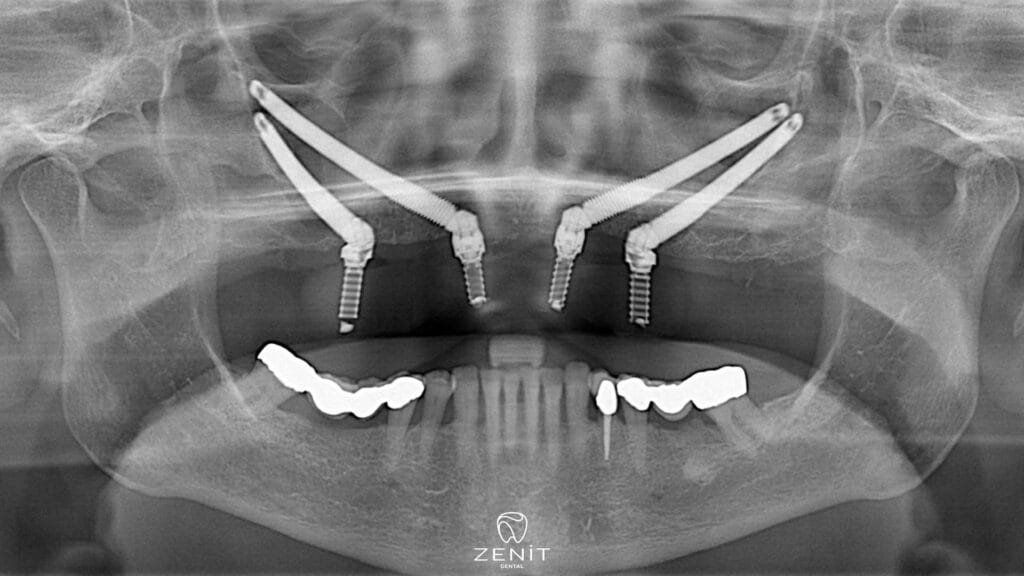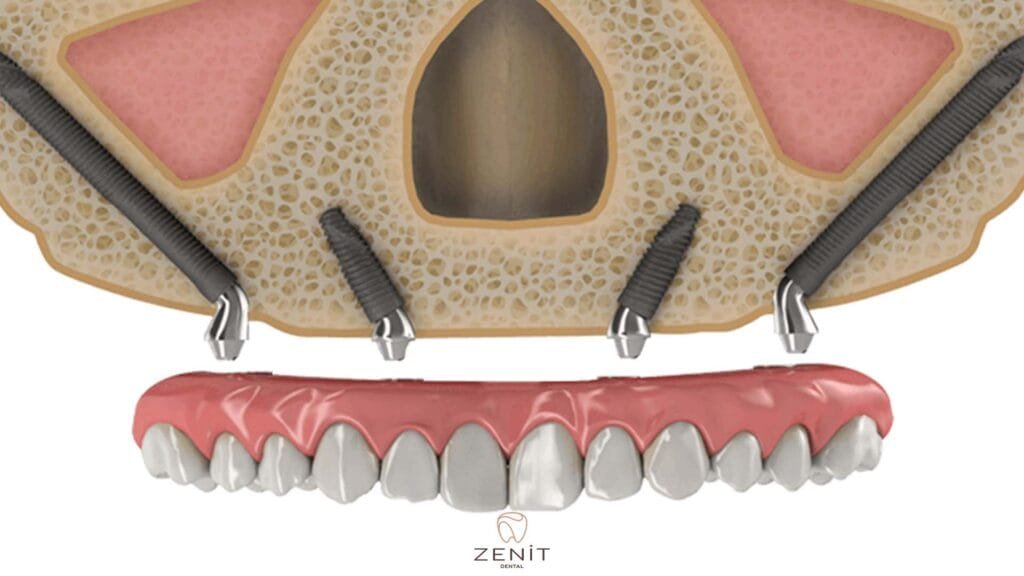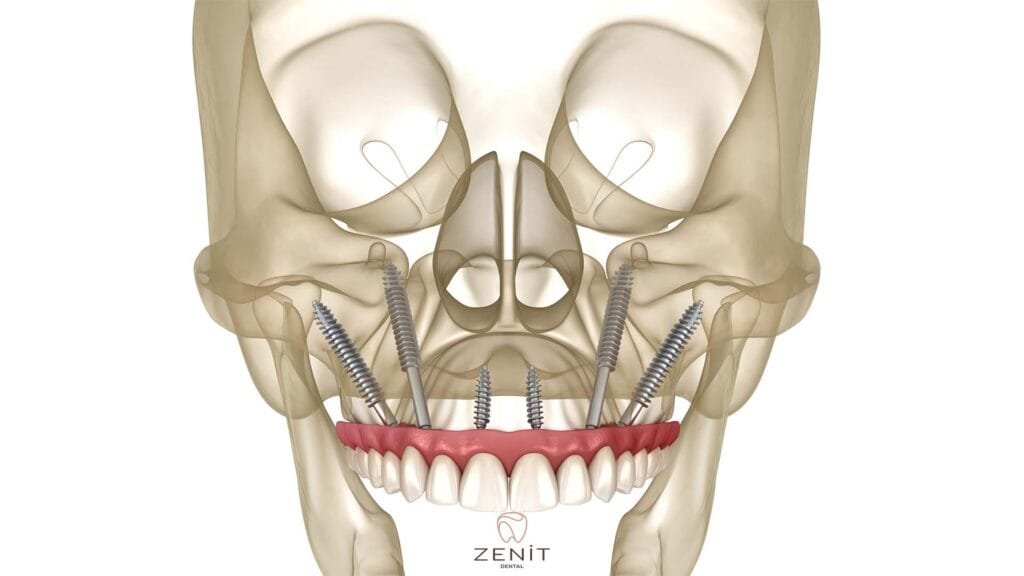Zygoma Implant
Oral and dental health is one of the most important components of general health. While a healthy and beautiful smile increases a person’s self-confidence, the correct functioning of the teeth and oral structure significantly affects the quality of daily life. However, problems such as tooth loss can cause serious problems both aesthetically and functionally. Tooth loss not only ruins your smile, but can also negatively impact chewing, speech and oral hygiene. Although traditional dental implants can largely solve such problems, in some cases implant placement is not possible due to insufficiency of the jawbone.
Zygoma implants offer an excellent alternative for patients with inadequate jawbone and provide a revolutionary treatment in the facial area. These special implants, unlike traditional implants, are placed in the zygomatic (zygoma) bone instead of the upper jaw bone. Since the zygomatic bone has a denser and stronger structure than the jawbone, zygoma implants can be safely placed in this area. Thanks to zygoma implants, even patients with advanced bone loss can achieve aesthetically and functionally satisfactory results.
What is Zygoma Implant?
Zygoma implants, unlike the traditional placement methods of dental implants, are implants specially designed for patients with jaw bone deficiency. Generally, in cases of jaw bone deficiency, it may be difficult to place an implant, especially in the upper jaw area. In this case, zygoma implants come into play.
Zygoma implants placed in the cheekbone, unlike other dental implants, are placed not in the jawbone, but in the area called zygomatic bone, which is located in the middle of the face and has a very solid structure. The zygomatic bone has a denser structure than other bones and bone loss usually does not occur. Thanks to this feature, zygoma implants offer a safe and effective solution to patients with jaw bone deficiency.
Zygoma implants are an ideal option for patients who have lost a number of teeth or have jaw bone deficiency. While it may be difficult to achieve successful results with traditional implants, especially in patients with advanced bone loss, zygoma implants can provide successful results even in such cases. These implants are designed to meet the aesthetic and functional needs of patients and aim to provide results closest to natural teeth.
It is considered a reliable option to improve oral and dental health and improve patients’ quality of life. As with other dental implants, it is important that zygoma implants are specifically planned and applied according to the patient’s oral structure and needs.
Advantages of Zygoma Implant

The advantages of zygoma implants offer an important solution for patients experiencing tooth loss and provide a number of benefits over traditional implant methods:
- No need for jaw bone grafting: With traditional implants, additional bone grafting may be required in patients who do not have sufficient jaw bone. This procedure prolongs the treatment process and requires additional surgery. However, since the zygomatic bone is used in zygoma implants, additional bone grafting is not required. This shortens the treatment process and allows patients to recover faster.
- Fast Recovery Process: Bone graft procedure can prolong the healing process and delay patients’ return to their normal lives. For zygoma implants, the healing process is faster since it is a procedure that does not require additional bone grafting. This allows patients to achieve a functional and aesthetic smile in a shorter time.
- High Success Rate: The success rate of zygoma implants is quite high. The zygomatic bone has a denser structure than other bones, and the fixation and integration of implants with the bone is more solid. This increases the long-term success of the treatment and allows patients to use it safely for a long time.
- Aesthetic and Functional Benefit: Zygoma implants meet both the aesthetic and functional needs of patients. Problems such as chewing difficulties, speech disorders and loss of self-confidence caused by tooth loss are effectively solved. These implants allow patients to achieve an aesthetic smile closest to natural teeth and help them regain normal chewing functions.
These advantages of zygoma implants significantly improve the quality of life of patients experiencing tooth loss and make the treatment process easier and more comfortable.
How to Perform a Zygoma Implant?
Zygomatic implant treatment is a complex procedure performed by an experienced surgeon. The procedure is usually done under general anesthesia and can take several hours. Application of zygomatic implants includes the following steps:
- Evaluation and Planning: The first step is to undergo a detailed evaluation of the patient. The condition of the jaw and facial bones is analyzed using advanced imaging techniques such as dental tomography.
- Implant Placement: Zygoma implants are placed in the cheekbone instead of the upper jawbone. The surgeon works with high precision when placing the implants, because reaching the zygomatic area and placing the implants in the correct position requires great care.
- Healing Process: After the implant is placed, a healing process is required for the bone and the implant to fuse (osseointegration). This process usually varies between 3-6 months. During this period, patients can use temporary prostheses.
- Placement of Permanent Dentures: After the healing process is completed, permanent dental prostheses are mounted on implants. This stage allows the patient to achieve aesthetic and functional results closest to natural teeth.
Is There a Risk of Zygoma Implant?
As with every surgical procedure, zygoma implants have some risks and side effects. However, these risks are minimized when performed by an experienced surgeon. Possible risks are:
- Infection: There is always a risk of infection after the surgical procedure. To reduce this risk, patients can be treated with antibiotics.
- Sinus Problems: Since zygomatic implants are placed in areas close to the sinus cavities, sinus problems may occur. However, with the right techniques, this risk is minimized.
- Pain and Swelling: It is normal to experience pain and swelling after surgery. These symptoms usually subside within a few days and can be controlled with painkillers.

Zygoma Implant Prices
The price of zygomatic implants can vary depending on a number of factors and is often determined by factors such as the patient’s individual condition, the extent of treatment and the materials used. Therefore, it is difficult to give an exact price because each patient has different needs and conditions.
Some factors that affect the cost of zygomatic implants include:
- Scope of Treatment: The treatment plan in which implants will be applied will depend on the patient’s tooth loss status, the number of implants and other dental procedures. Prices may vary depending on the complexity and duration of the treatment.
- Quality of Materials Used: The quality of the materials used in implants significantly affects the prices. More durable and long-lasting materials generally cost more.
- Individual Condition of the Patient: Each patient’s mouth structure, tooth loss status and general health condition are different. These factors can affect the complexity and therefore the cost of the treatment process.
- Physician Experience and Location: The physician’s experience and the location of the practice are other factors that affect prices. An experienced and specialized dentist can often charge higher prices.
To get clear information about the price of zygomatic implants, it is important to create an individual examination and treatment plan with a dentist. Your physician can give you a better idea of treatment options and costs and determine the most appropriate treatment for you.






